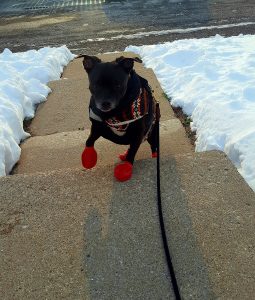 Unless you live or winter in a warm climate, there’s a good chance that during this time of year, you’ve have to adjust your pet’s lifestyle (and your own) to accommodate the frigid temperatures.
Unless you live or winter in a warm climate, there’s a good chance that during this time of year, you’ve have to adjust your pet’s lifestyle (and your own) to accommodate the frigid temperatures.
Because our pets have fur, we often do not think about protecting them from the elements. However, our furry family members need protection from the cold winter temperatures as well.
Read on for tips on protecting and maintaining your pet’s health during the cold, dry winter months!
Hydrate, Hydrate, Hydrate
Pets use a lot of energy staying warm, especially if they spend a lot of time outdoors or are in cooler inside temperatures. Drier indoor air and lying near heat sources can also cause pets to become dehydrated. Fresh water should be available at all times. We keep water bowls in every room that our pets frequent (which is pretty much every room in our home)!
A great way to get your pets drinking fresh water regularly is to provide them with a fresh flowing pet fountain. We have the PetSafe Big Dog Fountain and our dogs and cat constantly enjoy fresh, filtered water! We have clients that will let a bathtub faucet trickle during the day so that their cat has access to fresh flowing water. This is a viable option if you do not mind a slightly higher utility payment!
Air Quality
Unless you have a built in humidifier or run a separate air humidifier in drier months, you have most likely felt the effects of drier indoor air during the colder months. Itchiness, dry skin and constant coughing can be signs that moisture needs to be added to the air. A humidifier greatly help add much needed moisture back into the air when heat is being run constantly in the winter. Portable humidifiers are fairly inexpensive and come in different sizes depending on the square footage of the space your are humidifying. Another effective, inexpensive way to humidify an open area is to bring a large pot of water to a boil on the stove, Be sure to monitor regularly so that the pot doesn’t burn!
Nutritional Support
Indoor and outside pets have different nutritional needs. Dogs that live outside will require more energy to stay warm in frigid temperatures, so they will need more calories to account for the extra energy spent staying warm. Indoor pets will typically get less exercise in colder months, so it may be wise to adjust the daily caloric intake if your pooch appears to be picking up a bit of extra weight when it’s cold. You can also always up the amount of exercise as well…it will benefit you and your pet!
Have you noticed your dogs and cats seem to itch more when it’s colder? Heat can be drying to pet’s skin (and ours) if there is not enough moisture in the air. In addition to humidifying air using the above tips, consider adding additional fatty acids to food if your dog or cat seems to itch and scratch in excess. Salmon, mackerel and sardine oil are a great addition to the diet to help coat quality and skin. Eggs are also a great addition to diet for coat health.
Cold Weather Outdoor Safety
We don’t often think of our cars as a hazard for animals, but in cold temperatures, unfortunately they can become just that. Cats that live outdoors will use a warm car engine as a heat source in the winter. I once had a rat (yikes) nesting in my engine. Not a pleasant experience for sure! If you have a garage, be sure that it is secure in the winter so that stray animals can’t make a nest under the hood of your vehicle. If your car is parked outside, be sure to check under the hood or make some kind of noise to alert potential visitors that you might not want catching a ride.
Be careful of poisons you may encounter outdoors in winter! Antifreeze can be fatal to animals and the sweet taste and smell is attractive to them, causing them to be more likely to taste from puddles on the ground. Be careful of containers containing antifreeze that may be sitting around outside and be certain to check leaks. Do not let pets lick from puddles on the ground, even if they appear to only be water.
Salt is another potential poison to pets. When walking dogs, consider using booties or a protective wax for pads. Take time and care to thoroughly clean feet and coats of pets to remove salt and ice balls from walking in wintry conditions. Consider a cold weather coat for short haired dogs, puppies and elderly pets.
Keep them secure! Dogs can lose their sense of smell during heavy snow and winds. This will cause them to become lost quickly. Keep your dog on a leash during walks.
Dogs can suffer from frostbite and hypothermia if left outside too long in frigid temperatures. The tip of the tail, ears and paws are the most commonly affected areas so check them regularly and do not let pets stay outside too long without shelter when temperatures dip below freezing.
You can have a safe and healthy winter with your pet(s) by following these tips and regular old common sense. Be sure to discuss any changes in appetite, weight and behavior with your veterinarian if any out of the ordinary discomfort or behavior persist.
Check out some of our favorite cold weather care products below!
Did you enjoy this blog? We would love if you would share it with friends!

Leave a Reply